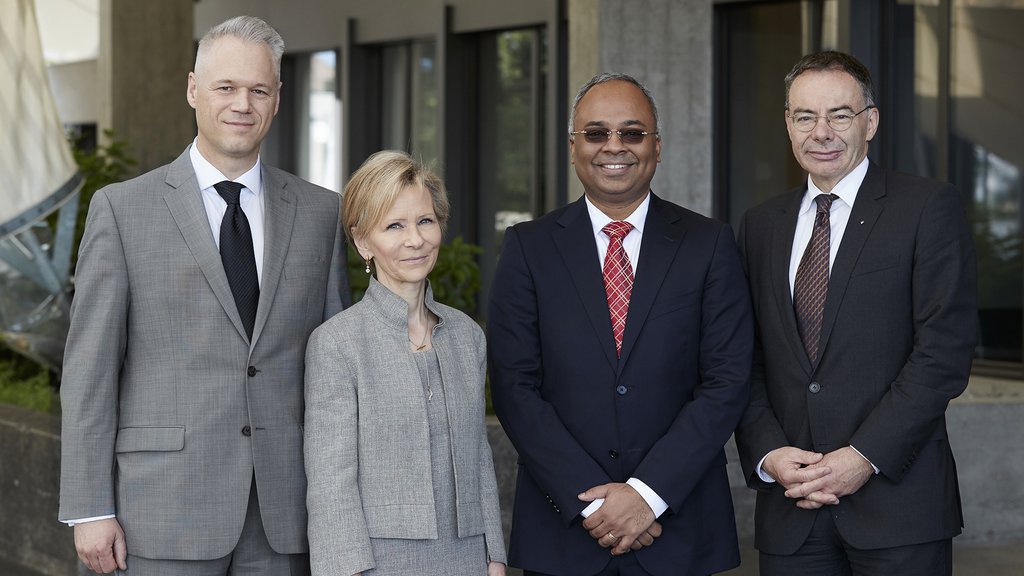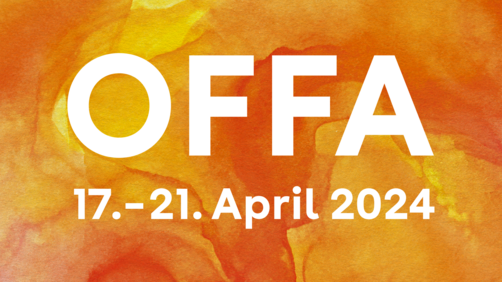Events - 26.05.2018 - 00:00
Dies academicus 2018
On 26 May 2018, the University of St.Gallen celebrated its dies academicus with University members and guests from politics, academia, business and the general public. Prof. Gerry Georg Ph.D. and Prof. Dr. Holger Mueller were awarded Honorary Doctorates of Economic Sciences, Federal Judge Dr. Martha Niquille-Eberle is a new Honorary Senator. Three particularly innovative research projects received the HSG Impact Award for the first time.

Dies Academicus 2018
26 May 2018. Numerous guests from academia, business and politics – among them the Chairman of the University's Board of Governors, Education Minister Stefan Kölliker, National Councillors Thomas Müller and Walter Müller, Minister of Health Heidi Hanselmann, Minister of Economic Affairs Bruno Damann, as well as representatives of 13 universities from home and abroad – together celebrated the University of St.Gallen's greatest day of the year, the dies academicus.
Success thanks to added value through personal encounters
President Thomas Bieger opened the ceremony and in his address spoke about "University 4.0 – of teaching and learning". Bieger came to four conclusions and challenges which resulted for the University of St.Gallen and its faculty from our world’s ever stronger digitalisation and interconnection. Firstly, human work had to have an added value in comparison with machines. This added value, on which university locations in particular depended, was generated by intelligence that was based on a higher level of learning than that of artificial intelligence. For universities, this meant that they had to focus even more on an exchange between practice and research, as well as on students' research-based learning. Secondly, only physical encounters set off learning processes, which "distance learning" was unable to do. This would require new learning methods besides education and training which pave the way for new insights and also influence behaviour. "University teaching must enable this new way of learning," said Thomas Bieger, which is why, thirdly, faculty would require new competencies. As curators and coaches, faculty would no longer stand between knowledge and students but would show students the direct way to the wealth of knowledge in the net and in books, to practitioners or fellow students, and would support them. Fourthly, this would require new infrastructures that would go above and beyond traditional classrooms and lecture halls. To conclude, Bieger emphasised that the University was meeting these challenges with the planned, donation-funded HSG Learning Center and creating arenas for debates, multimedia terminals for access to knowledge, as well as inspiring encounter zones for an exchange between researchers and students: "Added value through personal encounters and presence in an age of digitalisation with virtual reality – this is necessary, and this is our programme."
Teaching and learning in the digital age
"We don’t know where the development of university teaching is heading and how fast it will be," said Prof. Dr. Sarah M. Springman, the Rector of ETH Zurich, in her ceremonial address. Yet she would venture some forecasts about the constants and variables of university teaching. In this respect, a distinction had to be made between the "what" – the contents – and the "how", the methods. Digitalisation affected all the fields of knowledge and disciplines from the natural sciences to the technical sciences and the social sciences and humanities. This is why all the curricula would have to communicate digital learning contents such as data analysis, programming or the advanced application of standard software. In addition, digital competencies such as modelling and simulation would have to be taught in the natural and technical sciences, and the processing of big data sets in the social sciences and humanities. The new technologies would provide fantastic opportunities for the development of new teaching aids and new teaching methods and could help to maintain the quality of teaching at a high level or even to improve it despite the great numbers of students. Digitalisation was changing the forms in which knowledge was communicated, but personal interaction between teachers and learners would remain crucial.
A student reflection on the humanist education heritage
In his address Luca Serratore, 2017/2018 President of the Student Union, queried the University's self-image. Although the HSG was rightly considered to be one of Europe's leading business universities, the student representative considered that it was not necessarily the imparting of knowledge that should be given top priority but that an attempt should be made to boost the furtherance of an awareness of the universities' and students' responsibility towards society. In the face of the increasingly complex problems in the world it was all the more important that the knowledge that was imparted would be used to create an added value for society as a whole. Luca Serratore called upon every individual’s personal responsibility to make sensible use of his/her studies and came to the conclusion that present-day teaching would have to pursue a broader, more interdisciplinary approach that would be accompanied by constant critical reflection. Only in this way would it be possible to provide students with a better understanding of what was essential.
A new Honorary Senator and two new Honorary Doctors
Federal Judge Dr. Martha Niquille-Eberle was awarded the title of an Honorary Senator this year. "The University of St.Gallen (HSG) acknowledges her long, multi-faceted commitment to the Law School as an alumna, former assistant and lecturer, and as a member of the Advisory Committee of the Law School, in which she brings her perspective as a federal judge to bear."
The following personalities were awarded Honorary Doctorates:
- Prof. Gerry Georg, Ph.D., of Lee Kong Chian School of Business at the Singapore Management University: "With an Honorary Doctor’s degree in Economic Sciences (Dr. oec. h. c.), the University of St.Gallen acknowledges his outstanding academic achievements in the field of strategic management, innovation and entrepreneurship."
- Prof. Dr. Holger Mueller of Leonard N. Stern School of Business at New York University: "With an Honorary Doctor’s degree in Economic Sciences (Dr. oec. h. c.), the University of St.Gallen acknowledges his outstanding academic achievements in the field of theoretical and empirical corporate funding."
Outstanding achievements honoured
Three particularly innovative and relevant research projects were honoured with the newly created HSG Impact Award: the Global Trade Alert of Prof. Simon Evenett, Ph.D., the Open Source Behavioral Intervention Platform MobileCoach of Dr. Tobias Kowatsch, and the project entitled Futuricum – the success story of e-mobility of Martin Meier, Prof. Dr. Moritz Loock and Angela Honegger.
As the representative of the mobile bank N26, Valentin Stalf was elected HSG Founder of the Year 2018. The prize of the Werner Jackstädt Foundation is worth CHF 10,000.
The Fondation Latsis Internationale, Geneva, awards a generous annual prize at selected universities in Switzerland with the purpose of promoting young researchers. The 2018 Latsis Prize went to Dr. Dimitrios Georgakakis (PostDoc Research Fellow).
The Latin America Prize for Doctoral Theses at Swiss Universities, which is awarded by the HSG's Fund for the Promotion of Research into Latin America, went to Diego Enrique Silva Garzon.
The HSG's Student Union awarded two prizes: the prize for excellent teaching – the Credit Suisse Award for Best Teaching – went to Prof. Dr. Elgar Fleisch, Full Professor of Technology Management with special focus on Operations Management. The Mentor Prize was awarded to two persons: to Dr. Urs Landolf, President of HSG Alumni, and to Prof. Dr. Sascha Spoun, Visiting Professor of University Management.
More articles from the same category
Discover our special topics











